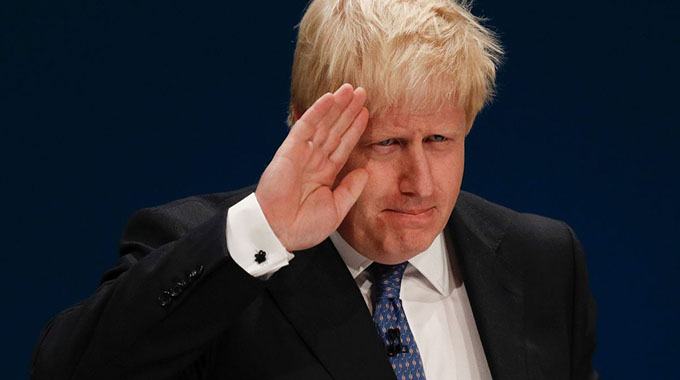EDITORIAL COMMENT: UK-Zim relations set for reset under new British PM

WE congratulate Mr Boris Johnson on his appointment as the British Prime Minister following his defeat of Mr Jeremy Hunt in an internal contest of the ruling Conservative Party.
Mr Johnson was elected party leader on Tuesday and became Prime Minister on Wednesday to replace Mrs Theresa May who resigned after failing to deliver on Brexit (British exit) — referring to the United Kingdom’s decision in a June 23, 2016 referendum to leave the European Union (EU).
The new UK Prime Minister landed the post after garnering 92 153 votes against Mr Hunt’s 46 656 votes in a ballot of party members. This represented a 66 percent margin of victory giving him an overwhelming mandate. On Wednesday, Mr Johnson wasted no time in constituting his new Cabinet, handing key roles to leading Brexiteers.
The appointments saw Mr Sajid Javid assume the post of Chancellor of the Exchequer while Mr Dominic Raab was appointed Foreign Secretary. Ms Priti Patel was handed the Home Secretary portfolio in a clear-out which saw more than half of Mrs May’s old Cabinet, including leadership rival Jeremy Hunt, quit or were sacked.
We welcome the change of guard at Number 10 Downing Street and hope the new man in London will embrace Zimbabwe’s re-engagement drive with Britain and the rest of the EU with open hands. Clearly, the new British Prime Minister has a busy domestic agenda top of which is getting the UK out of the EU by 31 October but he will not be blind to Britain’s foreign policy responsibilities. Given his strong grounding in the Conservative Party and its role in Zimbabwe’s independence and Lancaster House negotiations, Mr Johnson is alive to the intricacies of the land reform programme and its central role in the country’s current troubles.
Writing in The Telegraph newspaper when he was the Mayor of London in February 2015, Mr Johnson openly admitted that Britain played a “shameful” role in Zimbabwe’s economic woes, adding that former British Prime Minister Tony Blair had a hand in the country’s challenges.
“…It is vital to recognise that Zimbabwe was not always like this, and did not have to be like this. Britain played a shameful part in the disaster,” Mr Johnson wrote.
In a flashback, the new UK PM took readers back to the 1979 Lancaster House Agreement in which the then PM Margaret Thatcher granted independence to Rhodesia. It was that agreement that also guaranteed compensation for Britain’s settler farmers. But in 1997, he wrote, when Mr Blair and the New Labour came in “and in a fit of avowed anti-colonialist fervour”, they unilaterally scrapped the arrangement.
The International Development Minister, Ms Claire Short, made it clear that neither she nor Mr Blair gave a stuff about the former colonial farmers and their administration would not accept a special responsibility to meet the costs of land purchase in Zimbabwe. Mr Johnson said it was that betrayal of Lancaster House that forced former President Mugabe to launch the land reform programme.
We are glad that the new UK leader is clear about the source of problems between Harare and London. This puts him in good stead to resolve them. We thus urge him to accelerate the re-engagement drive with Zimbabwe with a view to normalising relations.
On Wednesday, President Mnangagwa wrote a congratulatory letter to Mr Johnson, saying he was looking forward to working with him and his administration in rebuilding a “once-formidable bi-lateral relationship” between the two countries.
“I look forward to meeting you in person in the near future, and to working with you and your administration as, together, we strive to return our once-formidable bilateral relationship to its rightful level, distancing ourselves from past differences and focusing instead on the future,” President Mnangagwa said.
He said over the 12-month period since he was elected as President of Zimbabwe, his administration has made considerable progress on political, economic and legislative reforms.
“A key component of those reforms is re-engagement with all those nations from which we have become somewhat estranged over the past two decades or so. Rebuilding our relations with the United Kingdom lies at the very core of that re-engagement process and is an objective to which my Administration and I are fully committed,” President Mnangagwa said.
“We are, of course, equally committed to an early re-admission to the Commonwealth family of nations, a process which is already underway. In this regard, Honourable Prime Minister, I know I can count on your continued support.”
We hope Mr Johnson will reciprocate President Mnangagwa’s gesture by accepting to let bygones be bygones and begin on a clean slate. Both countries stand to benefit immensely from a cordial relationship.
What is encouraging is that the re-engagement drive has already begun with high level visits by officials between the two nations. May this continue until the two leaders are able to sit across a table and break bread.











Comments